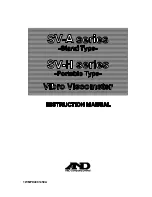
CLEANING OPTICAL COMPONENTS
PAGE
|
101
Important Note: Exercise great care when handling infrared optics; they are much more fragile
than common glass materials. Optical surfaces and coatings are easily damaged by rough handling
and improper cleaning methods.
Cleaning guidelines
•
Wear latex gloves or finger cots (powder-free) to prevent contamination of optical surfaces by
dirt and skin oils.
•
Never handle optics with tools; always use gloved hands or fingers.
•
Hold optics by the outer edge; never touch the coated surface.
•
Always place optics lens tissue for protection; never place optics on hard or rough surfaces.
•
It may be necessary to use a cotton ball or fluffed cotton swab instead of a lens wipe to uniformly
clean the entire surface of small-diameter mounted optics.
•
Before using any cleaning agents, read Material Safety Data Sheets (MSDS) and observe all
necessary safety precautions.
Caution: Possible Equipment Damage
Even small amounts of contamination on optics in the beam path can absorb enough energy to
damage the optic. Inspect beam delivery optics periodically for signs of contaminants and carefully
clean as required. In dirty environments, purge laser optics using filtered air or nitrogen to prevent
vapor and debris from accumulating on optical surfaces.
Important – i401 lasers have several beam conditioning optics between the output aperture and the
faceplate. To prevent dust and debris from damaging these optical surfaces, always connect
nitrogen or filtered air to the laser’s Gas Purge port.
Warning: Serious Personal Injury
Ensure that DC power to the laser is turned off and locked out before inspecting optical
components in the beam path. Invisible CO2 laser radiation is emitted through the aperture. Corneal
damage or blind-ness may result from exposure to laser radiation.
















































